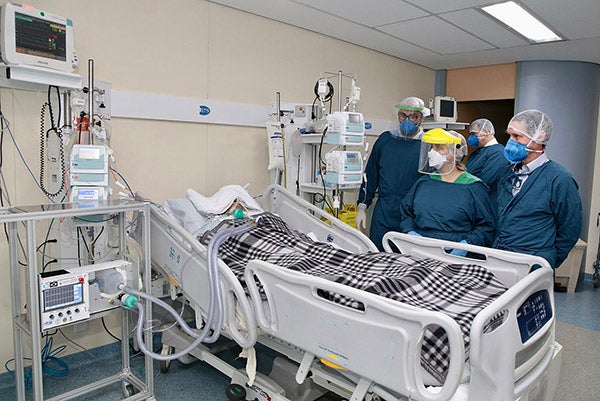Combating the COVID-19 Pandemic: Patent Waivers Must Extend Beyond Vaccines
Amitendu Palit, Mekhla Jha
28 May 2021Summary
India’s latest proposal at the World Trade Organization seeks patent waivers on a wide range of health products. This is essential as patent waivers on vaccines for COVID-19, excluding essential medicines and medical equipment, would leave many countries vulnerable in their efforts to manage the effects of the pandemic.
India, along with 61 other members of the World Trade Organization (WTO), has submitted a revised proposal seeking waivers on the enforcement of patent rights on cross-border movement of COVID-19 health products. The WTO will discuss the proposal soon. With the United States (US) expressing its support for patent waivers on vaccines, there is hope of the WTO reaching a consensus on the subject.
India’s latest proposal demands waivers on ‘health products and technologies’ to fight the COVID-19 pandemic. The products and technologies include vaccines, diagnostics, therapeutics, medical equipment, personal protective equipment, raw material and components required for these items, and their technologies. The temporary waivers are sought for three years.
Since India and South Africa submitted their first proposal seeking patent waivers in October 2020, the COVID-19 pandemic has assumed grave and severe proportions across the world. The rapid rise in COVID-19 related fatalities in a heavily populated country like India reflects the urgency of inoculating national populations. Fast mutation and spread of new virus strains also make it clear that an increase in production of vaccines needs to be accompanied by their swift distribution.
Intellectual property issues, primarily the importance of safeguarding patent obligations, are a major hindrance in stepping up global vaccine production. If these obligations are waived, then local producers in many countries can start making vaccines developed by global pharmaceutical companies and approved for public use, such as those by Pfizer-BioNTech, Moderna, AstraZeneca and Johnson & Johnson.
However, patent waivers just on vaccines will only partially address their global shortage. Local producers of patented vaccines will still be up against two major problems. The first is technology. If Indian vaccine producers obtain waivers to produce patented vaccines but do not have complementary waivers for the technologies to produce them, any meaningful improvement on the current situation can be ruled out. The second constraint in expanding vaccine production is the availability of raw materials. The US, for example, is one of the largest sources of raw materials required to produce vaccines. This makes India – the world’s largest vaccine producer – heavily dependent on America in the vaccine supply chain. The US, meanwhile, has been prioritising the supply of raw materials for local vaccine production. It is not just such prioritisation that might affect vaccine production elsewhere in the world. Many of the raw materials might also have patent protection affecting their cross-border access.
Vaccines are only a part of the health resources required to tackle the COVID-19 pandemic. The latest surge of infections in India and South Asia has highlighted the imperative for ramping up capacities across a range of essential health products. Foremost among these are medical equipment and devices. With hospitals stretched to their fullest capacities, many infected patients are forced to receive treatment at home. Households require several pieces of equipment, such as thermometers, pulse oximeters, respirators, nebulisers and oxygen concentrators, to administer such treatment.
However, many of these items are patented by their original manufacturers. For countries like India, where these are in high demand and are resorting to imports since their indigenous productions are insufficient, patent waivers can help to augment local manufacturing. Patent waivers are also essential to increase the global production of drugs necessary to treat COVID-19 patients. The Delhi High Court recently sought details of a patent for Tocilizumab – a drug found useful for treating COVID-19 patients – from its original producer Roche. Given the high demand and acute scarcity of the drug in India, the High Court’s ostensible objective was to ensure that patent rights do not come in the way of the award of a compulsory licence for local production of the drug. The example highlights the importance of WTO extending patent waivers to not just vaccines, but a whole range of health products, including medicines and medical equipment.
It is a good sign that along with the US, Russia and China have also supported discussions on waivers. Several other WTO members are also in support. However, whether text-based negotiations at the WTO will enable India and the sponsors of the latest proposal to secure as large scope for waivers as they envisage, will be known only in the coming weeks. A limited application of waivers on vaccines only will be insufficient to fight the pandemic.
. . . . .
Dr Amitendu Palit is a Senior Research Fellow and Research Lead (Trade and Economic Policy) at the Institute of South Asian Studies (ISAS), an autonomous research institute at the National University of Singapore (NUS). He can be contacted at isasap@nus.edu.sg. Ms Mekhla Jha is a student research assistant at ISAS. She can be contacted at Mekhla.jha@u.NUS.edu. The authors bear full responsibility for the facts cited and opinions expressed in this paper.
Photo credit: Wikipedia
-
 More From :
More From :
-
 Tags :
Tags :
-
 Download PDF
Download PDF



